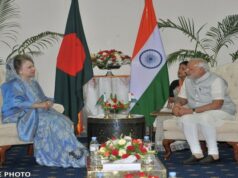Direct Lithium Extraction is an innovative technique being used to extract lithium, the metal widely used for making electric vehicle batteries, and is in high demand as the world shifts to green energy.
Unlike traditional methods, there are no pools of brine spanning the size of football fields where lithium is left behind after the liquid evaporates in the sun.
DLE, which extracts the metal much more quickly, could be critical to global production given 70% of the world’s lithium is found in brine, rather than rock or clay.
Eramet is being closely watched by competitors from the U.S. to Chile that are also working to commercialize DLE. It aims to pump out its first ton of lithium carbonate in November and scale up to 24,000 metric tons a year by mid-2025.
The $870 million project in the northern province of Salta puts Argentina, the world’s No. 4 lithium producer, in the spotlight ahead of projects due online in the country in the coming months from mining giant Rio Tinto, South Korea’s Posco and Chinese miners Zijin and Ganfeng.
Argentina’s new production should about double its capacity, narrowing the gap with Chile, Latin America’s top producer. Some analysts say it could overtake Chile around the end of the decade even if hurdles remain.
The exact timing for the ramp-up of Eramet’s Centenario plant, co-owned with Chinese nickel and steel giant Tsingshan, remains uncertain.
“It’s a complex plant,” CEO Christel Bories said in an interview. “The challenge is always, will we be able to reach the nominal capacity, and when?”
For over a decade, Eramet, which produces manganese, nickel and mineral sands elsewhere, tried different technologies before opting to develop a process largely in-house.
The need to tailor the extraction method to a specific brine deposit, each with its own concentration of lithium and other metals, is part of DLE’s complexity.
It will take time to see if Eramet’s strategy pans out, said Joe Lowry, an industry consultant. “The proof will be sustained consistent production of battery quality product, and it is too early to say this will happen with any degree of certainty.”
Thirty eight years in journalism, widely travelled, history buff with a preference for Old Monk Rum. Current interest/focus spans China, Technology and Trade. Recent reads: Steven Colls Directorate S and Alexander Frater's Chasing the Monsoon. Netflix/Prime video junkie. Loves animal videos on Facebook. Reluctant tweeter.




